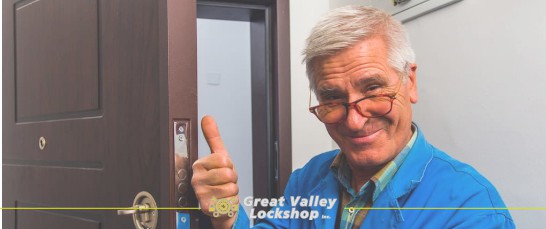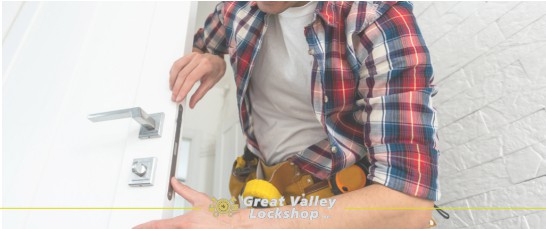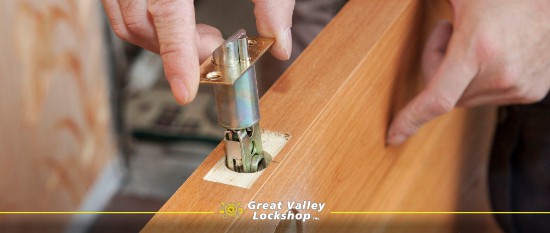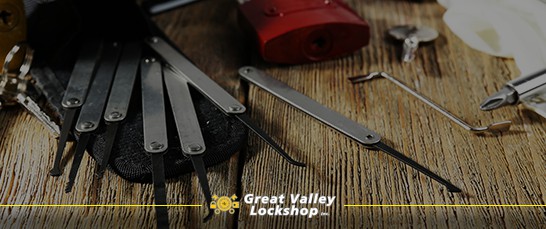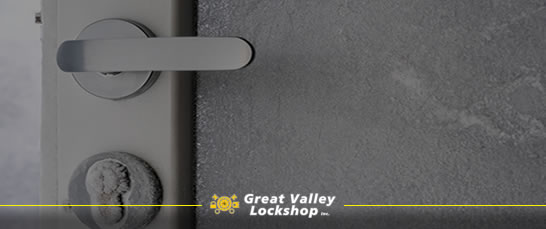
How Changes in Temperature Affect Locks
We usually only stop to think about the importance of locks when they’re not functioning as they should. Surprisingly, one of the most common causes of lock issues is the changing weather. As temperatures fluctuate, residential and commercial door locks may jam and not work properly.
How Does Hot Weather Affect Your Door Locks?
As temperatures warm up in the summer, many homeowners and business owners experience jam locks. This usually affects exterior doors, as increasing temperatures can cause the door to expand slightly. As a result, locks can become difficult to turn or get stuck entirely in one position.
This effect is more common in the following situations:
- For closed deadbolt locks, which are compressed in the door as the door frame swells around it.
- For wooden exterior doors and door frames, because wood material is more prone to swelling and contracting in extreme temperatures.
How Does Cold Weather Affect Your Door Locks?
In areas like Pennsylvania, lock problems often manifest themselves during the cold months of the year. When temperatures fall below freezing, the door frame tends to contract. This causes a poor fit between the lock and the door itself.
This effect is more common in the following situations:
- For wooden exterior doors and/or door frames, which are affected by the rising humidity levels.
- For door frames made of wood which tends to contract in colder temperatures.
You may find that it’s difficult to turn the key in a deadbolt when locking or unlocking exterior doors. For a quick fix, try pulling in on the door handle from the outside to re-center the lock within the door frame. However, this shouldn’t be considered a permanent solution, as it will likely get worse over time and eventually make it impossible to lock or unlock the door.
A Note About Car Locks
Cold temperatures can be a real pain when they affect car door locks. Moisture inside the lock can freeze if temperatures drop low enough. This renders it impossible for a key to turn the lock or even for a remote door opener to function properly.
In most situations, the best way to fix the problem is to carefully heat up the car’s key (using an open flame) before inserting it into the lock. If your car has a remote-start function, try heating up the car by letting the engine run for a few minutes. The locks will eventually unfreeze.
Get more information here: How to Open a Frozen Door Lock.
Preventative Measures
Fortunately, there are some preventative measures you can take to avoid these issues.
- Whenever you have new locks installed, be sure you’re working with an experienced locksmith. These professionals will ensure that the lock is properly fitted to the door frame, thus reducing problems with the changing weather.
- Consider replacing wooden exterior doors and frames with a more durable option that is more resistant in extreme temperatures. There are lots of options available, including aluminum, fiberglass and steel.
- Take the time to maintain locks by oiling regularly. This will make it easier to turn—even when the weather changes. To lubricate properly, you’ll need to take the lock apart first.
- Keep the lock dry. Ensure that overhangs, eaves and gutters are sufficient to keep rain and snow away from the door.
Different Ways Weather Affects Your Keyless Door Locks?
Keyless locks are becoming increasingly popular in the business world for both their security features and convenience. One of the advantages of keyless locks is that they’re not impacted by many of the issues that standard locks are during cold snaps and heatwaves.
The main advantages of electronic keyless locks are that you can program the entry system and review time-stamped access activity whenever it’s convenient. For commercial settings, it’s easy for business owners to grant or restrict access for employees, staff, suppliers or repair services in a set window of time. In residential settings, homeowners can program electronic keyless systems to give access to roommates, guests, children or delivery services, just to name a few examples. They can also be integrated into a more advanced smart home system.
Read more about the advantages of keyless entry systems.
There some important factors to consider, however, related to the effect that seasonal weather changes have on keyless locks. These include battery drain, mechanical issues and jammed buttons. Find out more about these issues which can impact the functionality and performance of all kinds of keyless lock systems.
Here are some of the ways that weather can affect keyless locks.
Battery Drain
Similar to cell phone batteries, electronic keyless locks have a shorter battery life when subjected to prolonged periods of cold temperatures. Cold snaps have the potential to drain battery life. This is one of the important considerations users need to weigh when choosing between a mechanical or electronic lock.
Under normal conditions, though, users need to change out batteries on electric locks about once a year.
Mechanical Issues
These types of keyless locks are considered “all-weather,” so exposure to water, in the form of rain or snow, is usually not a problem. However, exposure to high or low temperatures can play a role in how keyless locks work. Regularly oiling the locking mechanisms can often be the solution to poor functionality. Regardless of the type of lock on your home or business, it’s important not to shrug off the occasional maintenance.
Jammed Push Buttons
Mechanical keyless locks require users to punch in an access code on a keypad. One weather-related issue occurs when the keypad gets wet. If this moisture then freezes, it can potentially cause the keypad buttons to jam. This would block users from accessing the building. For a quick fix to this problem, try using a hair dryer to defrost the keypad and dry the excess moisture.
While keyless locks still require some regular maintenance to ensure their long-term effectiveness, they tend to be a much more worry-free option. If you are considering switching to this type of system, ask your local locksmith for recommendations regarding the right hardware solution for your home or business.
When to Call a Locksmith
If extreme hot or cold temperatures have made it difficult for you to operate the exterior door locks at your home or business, they may need to be re-fitted within the frame. This is a job best left to a professional locksmith, as it will likely involve fully removing the door and modifying it to ensure a perfect fit. Depending on the condition of the existing lock, it may be time to replace it altogether.
If you find yourself stuck with car door locks frozen shut, it’s in your best interest to contact a locksmith. Many quick, DIY fixes can damage the lock if not done properly. Call a locksmith to have your car door locks defrosted and avoid expensive damage.
Contact Great Valley Lockshop for expert assistance: (610) 644-5334 or fill out our online estimate request.
